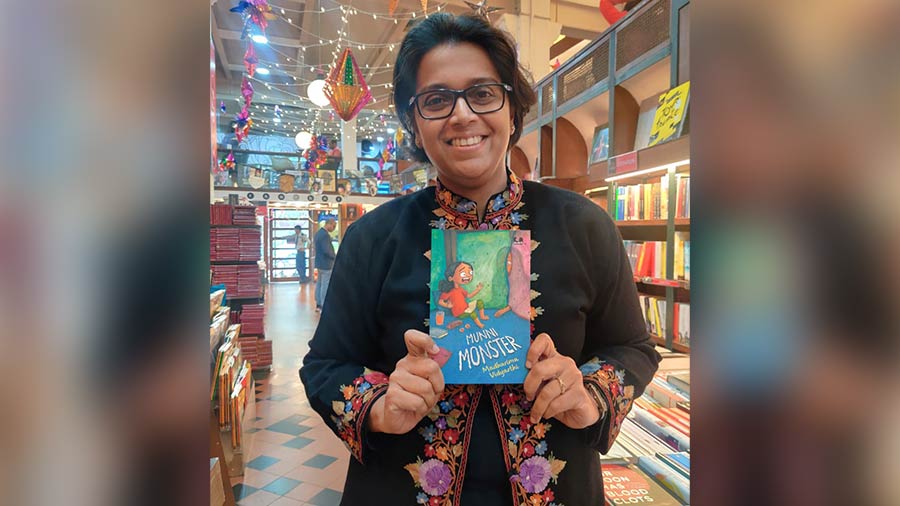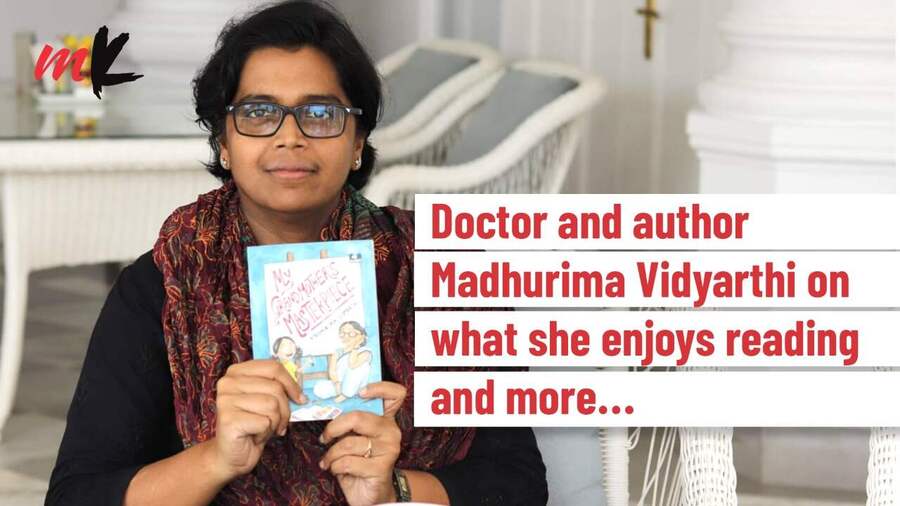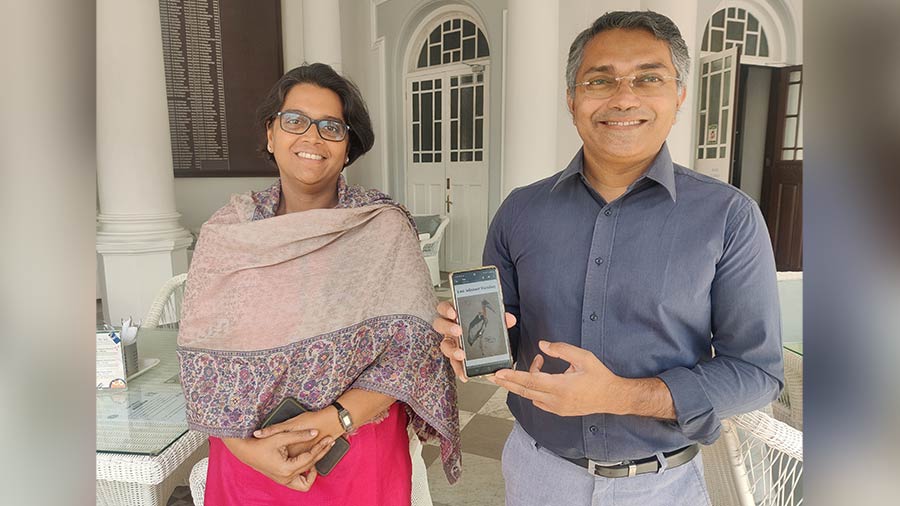She slurps as she drinks tea, crumbs fall on her and all around her as she eats her biscuits, she dribbles, she wears mismatched socks that she refuses to give for a wash, she hates being given a bath. She knows to share, to greet with a smile and to love. She is Munni Monster, the grandmother who crawls, from doctor-author Madhurima Vidyarthi’s book by the same name, which introduces the concept of disability, more specifically, cerebral palsy, and its many challenges to young readers.
Munni Monster (Duckbill), Vidyarthi’s second novel scheduled for release later this month, is inspired by her aunt-in-law, who lives with her and has cerebral palsy. The afterword of the book also has a beautiful picture of the two.
“Apart from challenges with communication, she also has severe mobility issues and, much like Munni in the book, she is literally a grandmother who crawls. The fine motor skills that allow us to perform day-to-day tasks so effortlessly are immense challenges for her,” Vidyarthi said.
Knowledge is helpful
Besides knowing and living with someone who has cerebral palsy, being a doctor also helped Vidyarthi keep her narrative simple and realistic without being preachy. “As a doctor, you are working with vulnerable people all the time. While I don’t work with learning disabilities or cerebral palsy as much, it is a part of our learning to communicate with people who are dealing with a range of issues, so that knowledge is helpful.”
Experienced guide
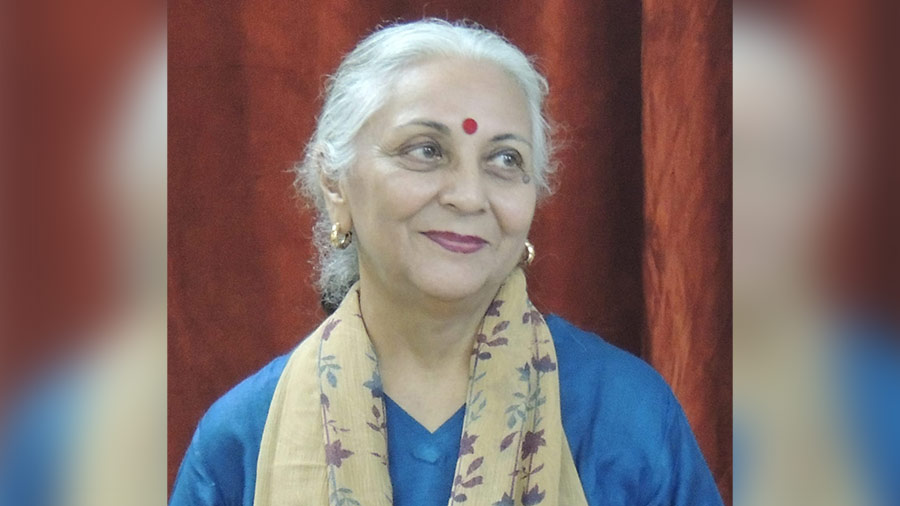
Sudha Kaul, the founder of the Indian Institute of Cerebral Palsy, advised and guided Vidyarthi
Vidyarthi was also advised and guided by Sudha Kaul, the founder of the Indian Institute of Cerebral Palsy (IICP) who has years of experience in the disability sector.
“Dr Vidyarthi is my husband’s diabetologist, and she felt that I could understand and empathise with her characters because I work with people who have communication disorders and cerebral palsy. Our understanding of people who were different is what brought us together. We both felt that you had to refer to them as individuals before their disability. Our conversations were based on a mutual understanding of looking at people as people, and not as people with disabilities,” said Kaul, who also helped the author draw up a list of verified organisations in India working with cerebral palsy. The list is included at the end of the book in the hope that “anyone reading the book could look up the websites and get more information”.
Child’s perspective
Munni, in the book, is seen through the eyes of 10-and-a-half-year-old Mishti. Vidyarthi found it easy to slip into a child’s lens as she has two growing children at home.
Vidyarthi was clear from the start that the book was not to be a statement, neither was it written with a mission. “It just came to me and I wrote it. The name Munni Monster comes from how a lot of people consider people with special needs to be monsters.”
The book doesn’t shy away from showing how toxic public perception can be. “I deliberately showed an outsider’s reaction to Munni as unparliamentary and not politically correct. My editor and I had a few exchanges about it and I insisted on retaining the harsh lens. The book would lose half the impact if this character wasn’t mirroring the people who are insensitive to disability.”
Vidyarthi reinforced that despite all the knowledge in the world, there is still a vast difference between engaging with a disabled person and living with one, which can only come from experience. “I knew about my aunt’s condition since before my marriage, but living with her still taught me a lot. You may have a lot of empathy and pure intentions, but living with a disabled person is still a learning curve.”
The familial aspect of the novel is what Kaul resonated with the most. “The characters are very natural in how they behave. At the core, it is a story of a family, which is just like every family around it, and yet has different issues.”
Kaul also lauded the tone of the narrative, which doesn’t try to impart knowledge from a pedestal and, instead, shares a personal experience. “The story does not tell kids how to behave with a disabled elder in the house. Today’s children will not read a book telling them what to do, but they will read a book where they can participate. It's not about sermonising, but inclusivity.”
Practical issues addressed

Vidyarthi’s book tries to capture the nuances of living with a person who has special needs Shutterstock
Munni Monster tries to capture the nuances of living with a person who has special needs, something that mainstream narratives leave out.
One of the most prominent issues families of persons with disability face is lack of medical insurance. “Ever since I got married, I have been trying to get medical insurance for my aunt. However, we have been unsuccessful with both government and private companies. When she was admitted to hospital during the second wave for COVID-19, it wasn’t a major problem because we are earning decently. But if we were a single income family or of very modest means, the situation would be very different. I have tried to introduce these challenges that middle-class families face because their needs are not looked after by society, and only the families who provide for them know exactly how difficult it gets. Without medical insurance, one admission to a prominent hospital can cost you lakhs.”
Kaul also drew attention to the lack of awareness. “Recently, a law has been passed by the Parliament according to which people with disabilities have the right to seek insurance. Unfortunately, every student I have spoken to has told me that there is no awareness about it, even in the case of insurance companies, so it is still very difficult for someone to procure insurance.”
But insurance is just one of many problems. Identification is another major challenge. “When my aunt was growing up, she only had a disabled ID card. We couldn’t get any other identity documents made because she did not have the required papers. Now, we are trying to at least get an Aadhaar card made for her because when she was admitted to the hospital, we couldn’t even get her COVID test done without an Aadhaar number. The problem doesn’t stop there, as even making the ID requires her to be taken all the way to the office in Salt Lake, which is very difficult,” Vidyarthi said.
Matters of the heart
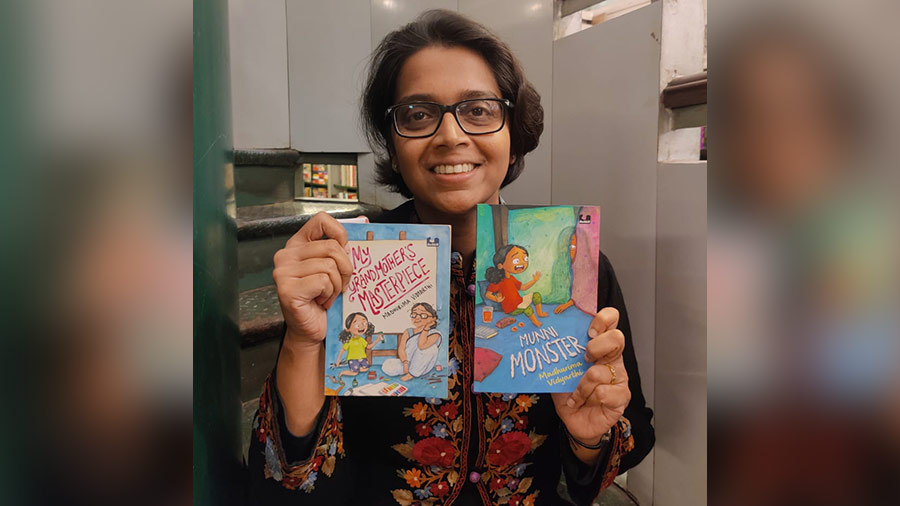
Vidyarthi poses with her two books
The shame many families feel when they have a member who suffers from cerebral palsy or communication disorders was what drove Vidyarthi to write the book.
In the Afterword, Vidyarthi pens down facts society sees in general but does not realise. For her, the biggest guiding principle is communication. “In the case of my aunt, I just speak to her as I would to anyone else and it gets through. You don’t need to treat people who have special needs with extra sympathy or kindness. Even if my aunt throws a tantrum, I speak to her normally and she calms down, listens and responds. When I am cross with her, she even calls me and tries to get back into my good books! (laughs) It’s a very intelligent relationship, just with different communication.”
Beyond the messaging and themes, what Vidyarthi wants is for the readers to ask questions. “Like my first novel (My Grandmother’s Masterpiece) I want people across generations to read it and think about the situations depicted, from disability to economic hardship. And, in the end, hopefully ask questions.”
